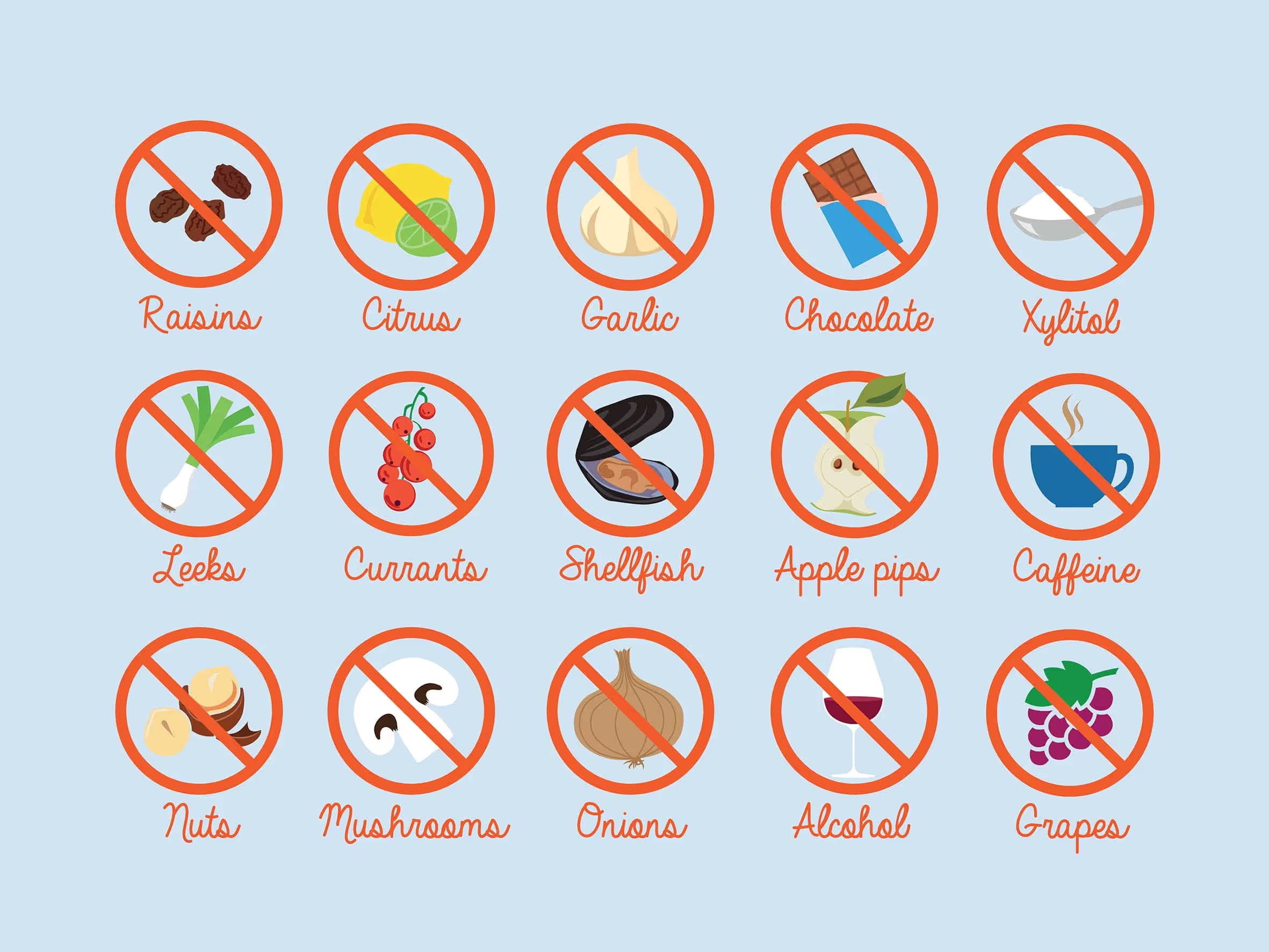- HomePage
- Most Asked
- Foods That Are Toxic To Dogs
Foods That Are Toxic To Dogs
Understanding what foods are harmful to dogs is key to ensuring their health and safety. This brief guide highlights the crucial information every dog owner should know.Some common human foods are toxic to dogs due to differences in metabolism. These foods can cause various health issues in dogs, ranging from mild to severe.
Many dog owners are unaware of the dangers certain foods pose to their pets. Everyday items like chocolate, grapes, and onions can be extremely harmful to dogs, leading to serious health complications.TAP ON THE IMAGE TO READ THE MORE OF THE ARTICLE.

Dangerous Foods for Dogs: What Not to Feed Them?
For dog owners, the health and well-being of their pets is a top priority. However, many are unaware that certain human foods can be poisonous or dangerous to dogs. This article aims to help dog owners protect their furry friends' health by listing foods that are toxic to dogs.
Chocolate and Caffeine
Chocolate is highly toxic to dogs. Theobromine, a substance in chocolate, can be easily metabolized by humans but is toxic and potentially fatal for dogs. Caffeine is similarly dangerous and should be avoided, including sources like coffee beans or tea leaves.
Grapes and Raisins
Grapes and raisins can cause serious kidney damage in dogs. The exact mechanism of this poisoning is unknown, but even small amounts can be dangerous.
Onions and Garlic
Onions and garlic can damage red blood cells in dogs, leading to anemia. These foods are harmful whether they are raw, cooked, or in powdered form.

Avocado
Avocado contains a toxin called persin. This substance can cause stomach upset in dogs and the avocado pit also poses a choking hazard.
Alcohol and Yeast Dough
Alcohol can lead to alcohol poisoning in dogs, causing symptoms like depression, loss of coordination, and coma. Yeast dough is similarly harmful as it can produce alcohol during digestion.
Xylitol
Xylitol is a sweetener found in many sugar-free products and can trigger insulin release in dogs, leading to hypoglycemia (low blood sugar). It can also cause liver failure and death.
The Effects of Sugary Foods and Sweeteners in Dogs
Introduction
The use of sugar and sweeteners in a dog's diet can have significant impacts on their health. Sugary foods and artificial sweeteners are processed differently in a dog's metabolism and can lead to serious health issues.
Key Points
Sugary foods can increase the risk of obesity, dental problems, and diabetes in dogs.
Artificial sweeteners, like xylitol, can cause poisoning and liver failure in dogs.
The effects of sweeteners on dogs can vary based on breed and size.
Conclusion
It is important for dog owners to avoid using sugar and artificial sweeteners in their pet's diet. A healthy diet is crucial for your dog to lead a long and happy life.
Homemade Dog Food: Safe and Unsafe Ingredients
Introduction
When preparing homemade dog food, knowing which ingredients are safe and which are dangerous is crucial. Properly selected ingredients can support your dog's health in homemade meals.
Key Points
Safe ingredients include chicken, turkey, vegetables, and some grains.
Unsafe ingredients are onions, garlic, grapes, chocolate, and xylitol.
Each dog is different, so consult with your veterinarian before starting a new diet.
Conclusion
Homemade dog food can be a healthy alternative when prepared with the right ingredients. However, be careful to meet your pet's nutritional needs.

Toxic Fruits and Nuts for Dogs
Introduction
Certain fruits and nuts can cause serious health problems for dogs. Avoiding these foods is important for maintaining your pet's health.
Key Points
Toxic fruits include grapes, raisins, avocados, and cherry pits.
Harmful nuts include macadamia nuts and walnuts.
The adverse effects of fruits and nuts depend on the amount and the dog's size.
Conclusion
By avoiding fruits and nuts that can be poisonous to dogs, you can help protect your pet's health. Always opt for safe food choices.
Allergies and Food Intolerance in Dogs: Symptoms and Management
Introduction
Allergies and food intolerance in dogs can lead to various health issues. Recognizing and managing these conditions are important for your pet's wellbeing.
Key Points
Allergy symptoms include itching, skin rashes, and gastrointestinal upsets.
Food intolerance can manifest as digestive problems and skin issues.
Proper diagnosis and diet adjustments are crucial for managing these conditions.
Conclusion
Identifying and managing food allergies and intolerances in dogs is key to their health and comfort. Consult with your veterinarian for guidance on dietary adjustments.
Emergency Poisoning in Dogs: What to Do?
Introduction
Understanding how to respond in a poisoning emergency is crucial for dog owners. Quick and appropriate actions can save a dog's life.
Key Points
Identify the signs of poisoning: vomiting, diarrhea, lethargy, and abnormal behavior.
Know the common toxic substances: human medications, certain foods, and household chemicals.
Immediate steps: remove the dog from the poison source, and don't induce vomiting unless instructed by a vet.
Conclusion
In case of suspected poisoning, contact your veterinarian or an emergency pet poison control center immediately. Time is of the essence in these situations.
Food Myths: Commonly Believed Safe Foods That Are Harmful to Dogs
Introduction
There are several misconceptions about what is safe to feed dogs. Knowing the truth can prevent health issues.
Key Points
Debunking myths: foods like bones, milk, and certain fruits are often mistakenly considered safe.
Understand why these foods are harmful: bones can splinter, and some fruits contain toxic substances.
Educating on safe alternatives to these foods.
Conclusion
Being informed about the actual effects of certain foods can help you make safer dietary choices for your dog.
Diet and Nutrition in Dogs: Healthy Alternatives and Recommendations
Introduction
A balanced diet is key to a dog's health. Understanding what constitutes a healthy diet is essential for dog owners.
Key Points
Discuss the components of a balanced dog diet: proteins, carbohydrates, fats, vitamins, and minerals.
Highlight the importance of age, breed, and health status in dietary choices.
Provide recommendations for healthy food alternatives and supplements.
Conclusion
Consulting with a veterinarian to tailor a diet plan that suits your dog's specific needs is the best approach to ensure their nutritional well-being.
Common Mistakes in Dog Nutrition and How to Avoid Them
Introduction
Many dog owners unintentionally make mistakes in their pets' diets. Being aware of these can enhance a dog's overall health.
Key Points
Common mistakes include overfeeding, inadequate variety, and giving inappropriate treats.
Explain the consequences of these mistakes: obesity, nutritional deficiencies, and health problems.
Tips on how to avoid these mistakes and maintain a balanced diet.
Conclusion
Regular vet check-ups and staying informed about proper dog nutrition can help avoid these common feeding errors.

Worldwide Dog Breeds
Labrador Retriever, German Shepherd, Golden Retriever, French Bulldog, Bulldog, Beagle, Poodle, Rottweiler, Yorkshire Terrier, Boxer, Siberian Husky, Dachshund, Great Dane, Doberman Pinscher, Australian Shepherd, Shih Tzu, Miniature Schnauzer, Chihuahua, Pomeranian, Cocker Spaniel, Bernese Mountain Dog, Shetland Sheepdog, English Springer Spaniel, Cavalier King Charles Spaniel, Border Collie, Bichon Frise, West Highland White Terrier, Papillon, Havanese, Brittany, Mastiff, Maltese, Vizsla, Weimaraner, Collie, Newfoundlander, Belgian Malinois, Rhodesian Ridgeback, Irish Setter, Newfoundland, Saint Bernard, Bull Terrier, Basset Hound, Akita, Bloodhound, Samoyed, Bullmastiff, Boston Terrier, American Staffordshire Terrier, Shiba Inu.
This list represents a broad spectrum of dog breeds from around the globe, each with unique traits and histories.
"Bir araştırmada, köpeklerde ve kedilerde gıda ile ilişkili zehirlenme vakalarının, çikolata ve çikolata bazlı ürünler, Allium spp. (soğan, sarımsak, pırasa ve frenk soğanı), macadamia fındıkları, Vitis vinifera meyveleri (üzüm, kuru üzüm, sultaniye ve siyah üzüm), ksilitolla tatlandırılmış ürünler, alkollü içecekler ve pişmemiş ekmek hamuru gibi maddelerin kazara tüketimi ile gerçekleştiği bildirilmiştir" (PMC, 2023).
Frequently Asked Questions
What Food Can Kill Dogs Instantly?
While no common food will kill a dog instantly, certain foods like chocolate, xylitol (found in sugar-free products), and large quantities of onions or garlic can cause rapid onset of severe symptoms that could be life-threatening if not treated immediately.
Foods That Are Toxic to Dogs and Cats?
Both dogs and cats can be harmed by foods like chocolate, caffeine, grapes and raisins, onions, garlic, xylitol, and alcohol. However, cats are also particularly sensitive to theobromine in chocolate, and certain human foods that may not affect dogs as severely.
Foods That Are Toxic to Dogs - ASPCA?
According to the ASPCA, toxic foods for dogs include chocolate, xylitol, avocado, onions and garlic, grapes and raisins, caffeine, alcohol, macadamia nuts, and foods high in salt and fat.
50 Foods Harmful to Dogs?
A comprehensive list of 50 harmful foods would include chocolate, grapes, raisins, onions, garlic, xylitol, caffeine, alcohol, avocado, macadamia nuts, bones (cooked), fat trimmings, yeast dough, apple seeds, cherry pits, peach pits, mustard seeds, raw potatoes, green tomatoes, rhubarb leaves, walnuts, nutmeg, and several more. This list is not exhaustive.
22 Foods That Can Kill Your Dog?
Key foods that could be lethal to dogs in certain amounts include chocolate, grapes, raisins, xylitol, onions, garlic, alcohol, caffeine, macadamia nuts, avocado, yeast dough, fat trimmings, hops, apple seeds, cherry pits, peach pits, mustard seeds, rhubarb leaves, and a few others. The severity depends on the dog's size, breed, and the amount consumed.
Human Foods Dogs Can Eat?
Dogs can safely eat certain human foods like carrots, apples (without seeds), white rice, dairy products in small amounts, fish, chicken, peanut butter (without xylitol), plain popcorn, pork, turkey, blueberries, bananas, cucumbers, and green beans. Always introduce new foods gradually and in moderation.
What Vegetables Are Toxic to Dogs?
Toxic vegetables for dogs include onions, garlic, chives, leeks, and shallots. These can cause gastrointestinal irritation and red blood cell damage. Also, raw potatoes and green tomatoes can be harmful due to solanine.
What is Toxic for Dogs if Eaten?
Foods toxic to dogs include chocolate, xylitol (found in sugar-free products), grapes and raisins, onions, garlic, caffeine, alcohol, avocado, macadamia nuts, and yeast dough. Certain human medications and plants are also toxic.
Can Dogs Eat Watermelon?
Yes, dogs can eat watermelon in moderation, but seeds and rind should be removed to avoid choking hazards and gastrointestinal upset.
Can Dogs Have Pineapple?
Yes, dogs can have small amounts of pineapple. It's high in sugar, so it should be given as a treat in moderation.
Can Dogs Have Cheese?
Dogs can have cheese in small quantities, as long as they are not lactose intolerant. Avoid high-fat cheeses and those with herbs or garlic.
What Meat Should Dogs Not Eat?
Dogs should not eat raw or undercooked meat due to the risk of bacterial infections. Avoid high-fat meats, meat with bones (especially cooked bones), and heavily seasoned or spiced meats.
Can Dogs Eat Tuna?
Dogs can eat tuna in moderation, but it should be plain and cooked (not in oil or with seasonings). Canned tuna in water is preferable to tuna in oil. Be cautious of mercury content, particularly in large tuna species.
Can Dogs Eat Banana?
Yes, dogs can eat bananas in moderation. They are a good source of potassium, vitamins, and fiber. However, due to their high sugar content, bananas should be given as a treat, not a regular part of the dog's diet.
Can Dogs Eat Scrambled Eggs?
Yes, dogs can eat scrambled eggs as long as they are cooked without any added salt, spices, or oil. Eggs are a good source of protein and can be a healthy addition to their diet in moderation.
13 Human Foods Toxic to Dogs:
Chocolate, grapes and raisins, onions and garlic, xylitol (found in sugar-free products), caffeine, alcohol, avocado, macadamia nuts, yeast dough, fruit seeds and pits (like apple seeds and cherry pits), nutmeg, mushrooms (certain types), and mustard seeds.
Are Strawberries Good for Dogs?
Yes, strawberries are good for dogs in moderation. They are low in calories and high in antioxidants, vitamins, and fiber. However, they contain sugar, so they should be given as an occasional treat.
Can Dogs Have Cucumbers?
Yes, dogs can have cucumbers. They are a low-calorie snack and good for hydration, as they are mostly water. Cucumbers also contain vitamins and minerals beneficial for dogs.
Can Dogs Eat Popcorn?
Dogs can eat plain, air-popped popcorn in small amounts. Avoid buttered, salted, or flavored popcorn, as these can be unhealthy for dogs.
Can Dogs Eat Ice Cream?
Generally, it's not recommended for dogs to eat ice cream, as many dogs are lactose intolerant. Ice cream is also high in sugar. There are dog-specific "ice cream" products that are a safer choice.
Can Dogs Eat Peanut Butter?
Yes, dogs can eat peanut butter as long as it doesn't contain xylitol or too much added sugar or salt. Peanut butter is a good source of protein and healthy fats but should be given in moderation.
Can Dogs Have Pickles?
Dogs can technically have pickles, but they are not recommended. Pickles are high in sodium and can contain spices that are not good for dogs. If you do give your dog pickles, it should be a very small amount and infrequent.
Conclusion
To safeguard the health of dogs, it's essential for owners to recognize and avoid feeding them toxic foods. Awareness and cautious feeding practices can prevent health crises and ensure the well-being of our canine companions.
Read More